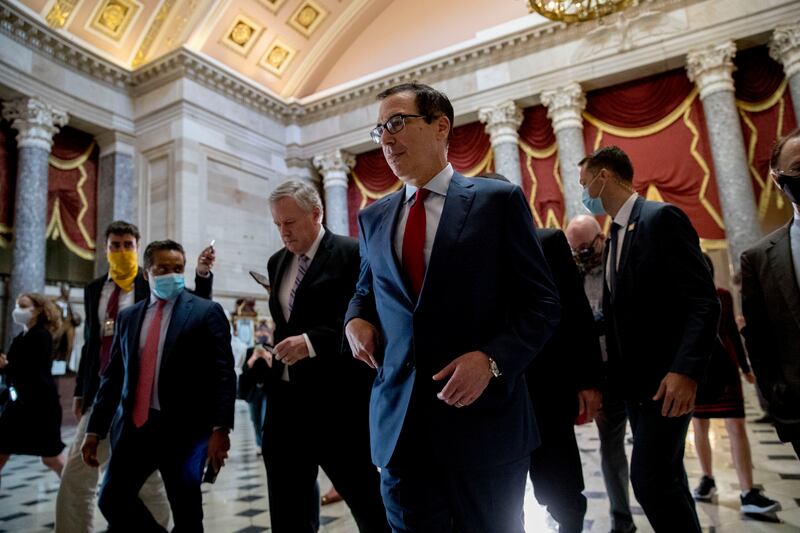We’re aware compromise in Washington is in short supply; it has been for some time. But for leaders to turn their backs on forging a stimulus plan for Americans desperate for coronavirus relief sets a new standard of partisan dysfunction.
Negotiations between House Speaker Nancy Pelosi and Treasury Secretary Steven Mnuchin ended abruptly Tuesday when President Donald Trump said he wanted to wait until after the election to pass a stimulus package. Perhaps recognizing the move was horrible politics, to say nothing of the relief it would withhold from desperate business owners and hard-hit families, he changed course a few hours later, tweeting that he would support a few stand-alone bills.
Those could include a $25 billion package for airlines, one of the hardest hit sectors in the economy, and $135 billion for the Paycheck Protection Program. The president also supports another round of checks for individuals. “If I am sent a Stand Alone Bill for Stimulus Checks ($1,200), they will go out to our great people IMMEDIATELY. I am ready to sign right now. Are you listening Nancy?” Trump tweeted on Tuesday.
Where was this urgency weeks, even months, ago, when both congressional chambers were deadlocked on a second stimulus package?
When pressed why House Democrats wouldn’t negotiate more with Republicans, Pelosi responded, “We came down a trillion dollars, and then we came down $200 billion more.” But to come down more than one thousand billion from the initial price tag isn’t much of a concession; it says the original bill had excessive amounts of bloat.
Senate Majority Leader Mitch McConnell, meanwhile, isn’t in a rush to see the job through. “We do need another rescue package but because of a pending election, we simply weren’t able to get together,” he said Wednesday on Fox.
No one in Washington has their hands clean. And where are Americans in all of their calculations? Forgotten, we’re afraid.
Despite a moderately strong economic comeback, credentialed voices are pleading for more help. Federal Reserve Chairman Jerome Powell reiterated on Tuesday that “Too little support would lead to a weak recovery, creating unnecessary hardship for households and businesses.” A group of more than 200 private and public sector organizations penned a letter to Congress this week, urging them to not break for recess without a stimulus deal. “Congress’s failure to act now will result in negative economic ramifications that will reverberate for decades,” they warned.
Lawmakers should also confront the fact that politically palatable relief efforts aren’t as effective as other tools at their disposal. Personal checks may score election points, but they offer the least bang for their buck, according to data compiled by the Kem C. Gardner Policy Institute at the University of Utah. Moderate- to high-income families likely stash the money in savings, and a single check can go only so far for a family that’s out of work.
On the other hand, programs like SNAP or enhanced unemployment benefits are more effective at stretching the dollars they receive. A targeted approach to funding those benefits, as well as supporting small businesses, is a more functional path for Congress’s efforts.
Pelosi, McConnell and their counterparts in the House and Senate could have this wrapped up in a week if they truly had America’s interests at heart. And for the sake of struggling families the country over, we hope they do.

